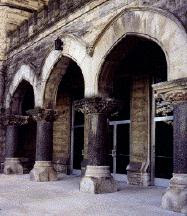Professor Wesley Calvert spoke on the topic 'How is a Proof Like a Function' at the Department Colloquium on April 1. No really he did! The abstract follows:
Mathematics seems to have quite a lot to do with functions; see how many mathematics courses are, implicitly, or explicitly, about functions. We mathematicians are also rather fond of proofs.
Proofs are the gold standard of what it means to have conclusively solved a mathematical problem. More recently, mathematicians have also been very interested in computers.
These three things (just a few of our favorite things) — functions, proofs, and computer programs — are related in very deep ways. In a sense, we can think of them as different forms of the same objects. I’ll tell you how this is so.
Wednesday, April 13, 2011
Gordon Discusses The Continuum Hypothesis.
Professor Evgeny Gordon spoke in the department colloquium on February 18th and 25-th the abstract of the talk follows:
L.V. Kantorovich, who is mostly known for the discovery of Linear Programming, was also an outstanding expert in functional analysis. He introduced and investigated conditionally order
complete vector lattices that are known in Russian mathematical literature as Kantorovich's spaces (K-spaces).
He came to these spaces in early 30's guided by the idea to find vector spaces that have as many properties of the field of real numbers as possible. At that time this problem couldn't be written in formal mathematical terms.
In the middle of 60's P. Cohen proved the independence of CH. The method of forcing that he developed for this problem was later rewritten in terms of Boolean-valued models of set theory by D. Scott and R. Solovay. In the middle of 70's I proved that Boolean-valued models of the field of real numbers are exactly the universal K-spaces. This fact did not only give a rigorous mathematical formulation to the problem of Kantorovich, but also allowed to transfer many properties of real numbers to K-spaces. In particular, it allowed generalizing a lot of theorems about linear functionals on operators with the values in Kantorovich spaces.
Many results in this area were obtained by functional analysts from Novosibirsk.
L.V. Kantorovich, who is mostly known for the discovery of Linear Programming, was also an outstanding expert in functional analysis. He introduced and investigated conditionally order
complete vector lattices that are known in Russian mathematical literature as Kantorovich's spaces (K-spaces).
He came to these spaces in early 30's guided by the idea to find vector spaces that have as many properties of the field of real numbers as possible. At that time this problem couldn't be written in formal mathematical terms.
In the middle of 60's P. Cohen proved the independence of CH. The method of forcing that he developed for this problem was later rewritten in terms of Boolean-valued models of set theory by D. Scott and R. Solovay. In the middle of 70's I proved that Boolean-valued models of the field of real numbers are exactly the universal K-spaces. This fact did not only give a rigorous mathematical formulation to the problem of Kantorovich, but also allowed to transfer many properties of real numbers to K-spaces. In particular, it allowed generalizing a lot of theorems about linear functionals on operators with the values in Kantorovich spaces.
Many results in this area were obtained by functional analysts from Novosibirsk.
Galperin Talks on the Dynamics of Continued fractions
Professor Gregory Galperin spoke on the dynamics of continued fractions in the departmental colloquium on March 4th. Professor Galperin discussed various results due to Gauss, Kuzman, Bykovskij and Arnold.
Subscribe to:
Posts (Atom)

